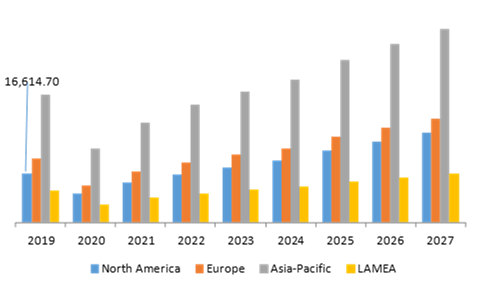Car Rental Market Report
RA00401
Car Rental Market, by Vehicle Type [Luxury Cars, Executive Cars, Economical Car, Sports Utility Vehicle (SUV), Multi Utility Vehicle (MUV)], Application (Leisure, commercial), Sales Channel (Online, Offline), Regional Analysis (North America, Europe, Asia Pacific, LAMEA): Global Opportunity Analysis and Industry Forecast, 2020–2027
The global car rental market forecast shall be $1,48,129.4 million by 2027, increasing from $92,252.4 million in 2019 at a healthy rate of 15.5%. The North America car rental market is estimated to increase at a CAGR of 17.8% by registering a revenue of $30,529.5 million, throughout the analysis period. Strategic collaborations among the market players along with the launching of advanced car rental services are expected to accelerate the North America car rental market growth.
Car Rental Market Analysis:
Car rental is a service wherein customers rent a car, use it, and pay for only the duration that the customer rented it for. A car rental (hire) agency offers a large selection of cars to customers at affordable rates.
Impact Analysis of COVID-19 on the Car Rental Market
The global car rental market is predicted to witness a low growth rate during the outbreak of the COVID-19 pandemic, owing to the hard-hit on the tourism industry, resulting in extreme revenue losses, massive shutdown, and avoidance of social life. As per data published by the world tourism organization (UNWTO), global tourism could decline by 60-80% in 2020 mainly because of the Covid-19 outbreak, resulting in a revenue loss of $910 billion to $1.2 trillion. Furthermore, leading car rental companies such as Avis are imposing cost-saving measures that include a 20% reduction in its fleet along with a 70% reduction in its workforce.
However, several companies operating in the car rental industry such as Revv and Rent-a-car are coming forward with their strategic steps to help society, during the COVID-19 chaotic situation. Fear of viral infection while using public transport is the main factor pushing the demand for rental car companies. Companies are hiring private rental cabs for their employees to assure safe travel to offices. Therefore, these enterprises have experienced sudden market growth in the COVID-19 pandemic. These key factors may generate investment opportunities for the car rental industry, in the global marketplace.
Superior services catering to the personalized needs of customers may generate remarkable revenue for the global car rental market
The car rental industry is witnessing massive growth mainly because of the increase in the disposable income of consumers followed by the influence of high standard of living and spending more on luxury vehicles for traveling. Moreover, the ventures involved in car rental businesses are providing cars according to the demand of customers with enhanced advanced safety features at a less expensive rate. Also, to maintain and fulfill all the requirements of high-performance cars, car rental companies such as Sixt SE and The Hertz Corporation have integrated their cars with smart digital solutions. For instance, in February 2019, the SIXT SE company digitalized the car rental process in Europe. Also, the company adopted connectivity technologies for its fleet management and has already connected thousands of vehicles through the IoT cloud platform. These advancements may lead to an increase in the demand for car rental services in the global market.
To know more about car rental market drivers, get in touch with our analysts here.
A surge in low-cost public transportation may restrain the growth of the global car rental industry
The notable growth in low-cost transportation in the developed, as well as developing countries, may obstruct the growth of the global market. Moreover, volatility in the prices of oils may also create a negative impact on the global car rental market during the forecast period.
The growing emphasis on car rental management software may create huge opportunities for the global car rental market, in the future
The car rental industry is growing at a very fast pace due to the rise in urban population and tourism. The growth in the number of tourists for national and international travel in different countries like India, Indonesia, and Indonesia is expected to provide lucrative opportunities for the car rental market. Leading car rental companies are involved in providing connectivity among people by availing good services for traveling. To offer more effective and efficient services to their customers in the future, car rental companies are looking forward to car rental management software, as it helps in minimizing repetitive tasks and exhibit concentration on developing new business models and strategies. Moreover, it is providing easy online and offline booking services to people for various purposes such as business, leisure, and others. Thus, increasing penetration of car rental management software offers huge opportunities in the forecast period.
To know more about car rental Market Opportunities, get in touch with our analysts here.
Car Rental Market, by Vehicle Type:
The sports utility vehicle (SUV) will generate a revenue of $13,131.9 million by 2027, mainly because of its enhanced flexibility along with the adequate space for occupants
Source: Research Dive Analysis
The global SUV rental market shall have the fastest market growth and it is anticipated to generate a revenue of $13,131.9 million by 2027, growing from $7,532.6 million in 2019. The growth of the SUV segment for the global car rental market is mainly attributed to increased safety & convenience, adequate space for the occupants, and enhanced flexibility, comfort, and security. Rental SUVs are considered to be one of the perfect options for family trips owing to the GPS facilities, additional cargo space, and availability of popular brands including the Range Rover Evoque, Mercedes GLA, Volvo XC90 and Ford Kuga. Also, these models feature infotainment options to keep tourists entertained and connected during traveling. These key factors are expected to boost the demand for rental SUVs in the global market, during the projected period.
However, the economic vehicle type shall have a dominating market share in the global market and is expected to register a revenue of $47,323.9 million, during the analysis timeframe. Owing to the increasing concern about environmental pollution, global auto-makers have seen huge demand for electric luxury cars, around the globe. Thus, multiple ventures involved in the car rental services are predicted to offer rental electric vehicles cars (EV) in the upcoming years. For instance, in June 2020, Lyft, the leading player in car rental services, announced that the enterprise will go for 100% adoption of rental EVs by the end of the year 2030. These initiatives may create massive opportunities for the sub-segment, throughout the forecast period.
Car Rental Market, by Application:
The global leisure segment for car rental market will have the highest market share; this is mainly because of the growing disposable income
Source: Research Dive Analysis
The leisure sub-segment of the car rental market will have the fastest growth and it is projected to surpass $95,179.0 million by 2027, with an increase from $61,691.0 million in 2018; this is mainly owing to the steady demand from tourists, particularly of developing economies. Moreover, the extensive growth of the segment is mainly attributed to the increasing disposable income, availability of online platforms, massive penetration of smartphones, and the surge in tourism across the globe.
On the other hand, the commercial sub-segment for the car rental market will be the rapidly-growing segment and is estimated to generate a revenue of $52,947.4 million, throughout the analysis timeframe. In recent years, organizations operating in the corporate sector across the globe are adopting to car rental option to enhance employee benefit packages with a decrease in the overall operational expenditure. Thus, many car rental service providers such as Europecar, Avis group, and Enterprise Holdings have started providing services to the corporate sectors. In addition to this, Toyota Motor Corp., a leading Japanese multinational automotive manufacturers are also entering into the car rental business to gain a strong hold into regional as well as the global auto industry, in the upcoming years. Thus, in August 2020, Toyota has launched a car leasing service in India particularly in Bengaluru, Mumbai, and Delhi. These factors are responsible for the flourishing of the segment growth, over the analysis timeframe.
Car Rental Market, by Sales Channel:
The online sales channel will have the significant-growth in the global market; this is mainly because of the rising demand for comfort, convenience, and safety
Source: Research Dive Analysis
The online sales channel for the car rental market shall have rapid growth and it is anticipated to generate a revenue of $1,07,144.0 million by 2027, during the forecast period. An online car rental system will help enterprises to manage multiple bookings, track various rental statuses, contact the designated customers, statuses of cars, and bill different bookings aptly. Also, ease in accepting reservations, pre-requisite car check updates, scheduling a car for pick up by the customer, availability checks, and other operations can be performed by the online channel, which will eventually increase the adoption of the segment, throughout the projected timeframe.
Regional Insights:
North America region has a lucrative market and it will reach up to $30,529.5 million by the end of 2027 mainly because of the presence of industry players and their heavy investments to enhance the safety & convenience of customers
Source: Research Dive Analysis
The North America car rental market accounted for $16,614.7 million in 2019 and is projected to register a revenue of $30,529.5 million by 2027. The extensive growth of the North America car rental market is mainly driven by the key factors such as heavy investments by market players along with the adoption of advanced systems such as innovative apps due to superior advantages. Also, massively increasing demand from the companies operating in the corporate sector is also likely to bolster the demand for car rental services, which will ultimately accelerate the car rental market growth, during the analysis period.
Asia-Pacific car rental market share is projected to grow at a CAGR of 15.0% by registering revenue of $65,651.0 million by 2027. Extensively increasing sales adoption of car rental services in the corporate sector, growing disposable incomes, and increase penetration of smartphones in Asian countries particularly in Japan, China, South Korea, and India is projected to boost the growth of the car rental market in the Asian Market. Furthermore, leading players are operating in the car rental services are opting for various effective strategies such as strategic alliances, launching of value-added products/services, and business expansion to strengthen market position in the global industry. For instance, in August 2020, Air Asia India has teamed up with Avis India to provide premium car rental services to airline-passengers. According to this deal, Air Asia India travelers can utilize the services of Avis across 14 cities including Noida, Delhi, Faridabad, Gurugram, Mumbai, Bengaluru, Chennai, Hyderabad, Chandigarh, Kolkata, Pune, Kochi, Jaipur, and Bhubaneswar. such key factors are expected to propel the growth of the market, over the forecast period.
Competitive Scenario in the Global Car rental Market:
The advanced product development coupled with mergers & acquisitions are the frequent strategies followed by the significant market players
Source: Research Dive Analysis
Some of the leading car rental market players include Avis Budget Group, Enterprise Holdings Inc., SIXT SE, Europecar, The Hertz Corporation. Bettercar Rental LLC, Carzonrent, Al-Futtaim., Eco Rent a Car., and Localiza. Car rental market players are focusing on Merger & acquisition and advanced product developments. These are the effective strategies followed by the startup as well as established organizations.
Porter’s Five Forces Analysis for Car Rental Market:
-
Bargaining Power of Suppliers: The car rental service suppliers are high in number, and established service providers of the car rentals are much larger and globalized. So, there will be less threat from the supplier. Thus, the bargaining power of the supplier is Moderate
-
Bargaining Power of Buyer: Buyers will have huge bargaining power, significantly because of multiple players operating in the car rental services. The car rental service provider offers multiple cars with popular brands at an affordable price rate. The buyers can freely choose the convenient service that best fits their preferences. Thus, the bargaining power of the buyer is HIGH
-
Threat of New Entrants: The companies entering into the car rental market are adopting technological innovations such as developing integrated apps to attract the customers. Also, these companies are implementing various effective strategies such as offering discounts, free-rides, and many among others. Thus, the bargaining power of the new entrant is Moderate
-
Threat of Substitutes: Customer preference and several substitutes are available in this market such as government transportation services. However, such alternative options can’t offer the kind of accessibility and convenience that a car rental service does. Thus, the threat of substitute is Low
-
Competitive Rivalry in the Market: The competitive rivalry among the industry leaders is rather intense, especially between the global players including Avis Group, The Hertz Corporation, and Enterprise Holdings Inc. These companies are launching their value-added services in the international market and strengthening the footprint worldwide. Competitive Rivalry in the Market: High
| Aspect | Particulars |
| Historical Market Estimations | 2018-2019 |
| Base Year for Market Estimation | 2019 |
| Forecast timeline for Market Projection | 2020-2027 |
| Geographical Scope | North America, Europe, Asia-Pacific, LAMEA |
| Segmentation by Vehicle Type |
|
| Segmentation by Application |
|
| Segmentation by Sales Channel |
|
| Key Countries Covered | U.S., Canada, Mexico, Germany, France, UK, Italy, Spain, Russia, Rest of Europe, China, Japan, India, Australia, South Korea, Rest of Asia-Pacific, Brazil, Saudi Arabia, United Arab Emirates, Rest of LAMEA |
| Key Companies Profiled |
|
Q1. What is the size of the car rental market?
A. The global car rental market size was over $92,252.4 million in 2019 and is projected to reach $1,48,129.4 million by 2027.
Q2. Which are the major companies in the car rental market?
A. Avis Budget Group, Enterprise Holdings Inc., and SIXT SE, are some of the key players in the global car rental Market.
Q3. Which region possesses greater investment opportunities in the coming future?
A. The North America region possesses great investment opportunities for the investors to witness the most promising growth in the future.
Q4. What is the growth rate of the North America market?
A. North America car rental market is anticipated to grow at 17.8% CAGR during the forecast period.
Q5. What are the strategies opted by the leading players in this market?
A. Capacity expansion, product development, along with joint ventures are the key strategies opted by the operating companies in this market.
Q6. Which companies are investing more on R&D practices?
A. Europecar and The Hertz Corporation. companies are investing more on R&D activities for developing new products and technologies.
1. Research Methodology
1.1. Desk Research
1.2. Real time insights and validation
1.3. Forecast model
1.4. Assumptions and forecast parameters
1.4.1. Assumptions
1.4.2. Forecast parameters
1.5. Data sources
1.5.1. Primary
1.5.2. Secondary
2. Executive Summary
2.1. 360° summary
2.2. By Vehicle Type trends
2.3. By Application trends
2.4. By sales Channel trends
3. Market Overview
3.1. Market segmentation & definitions
3.2. Key takeaways
3.2.1. Top investment pockets
3.2.2. Top winning strategies
3.3. Porter’s five forces analysis
3.3.1. Bargaining power of consumers
3.3.2. Bargaining power of suppliers
3.3.3. Threat of new entrants
3.3.4. Threat of substitutes
3.3.5. Competitive rivalry in the market
3.4. Market dynamics
3.4.1. Drivers
3.4.2. Restraints
3.4.3. Opportunities
3.5. Technology landscape
3.6. Regulatory landscape
3.7. Patent landscape
3.8. Pricing overview
3.8.1. By Vehicle Type
3.8.2. By Application
3.8.3. By Sales Channel
3.9. Market value chain analysis
3.9.1. Stress point analysis
3.9.2. Raw material analysis
3.9.3. Manufacturing process
3.9.4. Distribution channel analysis
3.9.5. Operating vendors
3.9.5.1. Raw material suppliers
3.9.5.2. Product manufacturers
3.9.5.3. Product distributors
3.10. Strategic overview
4. Car Rental Market, by Vehicle Type
4.1. Luxury Cars
4.1.1. Market size and forecast, by region, 2019-2027
4.1.2. Comparative market share analysis, 2019 & 2027
4.2. Executive Cars
4.2.1. Market size and forecast, by region, 2019-2027
4.2.2. Comparative market share analysis, 2019 & 2027
4.3. Economical Car
4.3.1. Market size and forecast, by region, 2019-2027
4.3.2. Comparative market share analysis, 2019 & 2027
4.4. Sports Utility Vehicle(SUV)
4.4.1. Market size and forecast, by region, 2019-2027
4.4.2. Comparative market share analysis, 2019 & 2027
4.5. Multi Utility Vehicle(MUV)
4.5.1. Market size and forecast, by region, 2019-2027
4.5.2. Comparative market share analysis, 2019 & 2027
5. Car Rental Market, by Application
5.1. Leisure
5.1.1. Market size and forecast, by region, 2019-2027
5.1.2. Comparative market share analysis, 2019 & 2027
5.2. commercial
5.2.1. Market size and forecast, by region, 2019-2027
5.2.2. Comparative market share analysis, 2019 & 2027
6. Car Rental Market, by Sales Channel
6.1. Online
6.1.1. Market size and forecast, by region, 2019-2027
6.1.2. Comparative market share analysis, 2019 & 2027
6.2. Offline
6.2.1. Market size and forecast, by region, 2019-2027
6.2.2. Comparative market share analysis, 2019 & 2027
7. Car rental Market, by Region
7.1. North America
7.1.1. Market size and forecast, by vehicle type, 2019-2027
7.1.2. Market size and forecast, by application, 2019-2027
7.1.3. Market size and forecast, by sales channel, 2019-2027
7.1.4. Market size and forecast, by country, 2019-2027
7.1.5. Comparative market share analysis, 2019 & 2027
7.1.6. U.S.
7.1.6.1. Market size and forecast, by vehicle type, 2019-2027
7.1.6.2. Market size and forecast, by application, 2019-2027
7.1.6.3. Market size and forecast, by sales channel, 2019-2027
7.1.6.4. Comparative market share analysis, 2019 & 2027
7.1.7. Canada
7.1.7.1. Market size and forecast, by vehicle type, 2019-2027
7.1.7.2. Market size and forecast, by application, 2019-2027
7.1.7.3. Market size and forecast, by sales channel, 2019-2027
7.1.7.4. Comparative market share analysis, 2019 & 2027
7.1.8. Mexico
7.1.8.1. Market size and forecast, by vehicle type, 2019-2027
7.1.8.2. Market size and forecast, by application, 2019-2027
7.1.8.3. Market size and forecast, by sales channel, 2019-2027
7.1.8.4. Comparative market share analysis, 2019 & 2027
7.2. Europe
7.2.1. Market size and forecast, by vehicle type, 2019-2027
7.2.2. Market size and forecast, by application, 2019-2027
7.2.3. Market size and forecast, by sales channel, 2019-2027
7.2.4. Market size and forecast, by country, 2019-2027
7.2.5. Comparative market share analysis, 2019 & 2027
7.2.6. Germany
7.2.6.1. Market size and forecast, by vehicle type, 2019-2027
7.2.6.2. Market size and forecast, by application, 2019-2027
7.2.6.3. Market size and forecast, by sales channel, 2019-2027
7.2.6.4. Comparative market share analysis, 2019 & 2027
7.2.7. UK
7.2.7.1. Market size and forecast, by vehicle type, 2019-2027
7.2.7.2. Market size and forecast, by application, 2019-2027
7.2.7.3. Market size and forecast, by sales channel, 2019-2027
7.2.7.4. Comparative market share analysis, 2019 & 2027
7.2.8. France
7.2.8.1. Market size and forecast, by vehicle type, 2019-2027
7.2.8.2. Market size and forecast, by application, 2019-2027
7.2.8.3. Market size and forecast, by sales channel, 2019-2027
7.2.8.4. Comparative market share analysis, 2019 & 2027
7.2.9. Spain
7.2.9.1. Market size and forecast, by vehicle type, 2019-2027
7.2.9.2. Market size and forecast, by application, 2019-2027
7.2.9.3. Market size and forecast, by sales channel, 2019-2027
7.2.9.4. Comparative market share analysis, 2019 & 2027
7.2.10. Italy
7.2.10.1. Market size and forecast, by vehicle type, 2019-2027
7.2.10.2. Market size and forecast, by application, 2019-2027
7.2.10.3. Market size and forecast, by sales channel, 2019-2027
7.2.10.4. Comparative market share analysis, 2019 & 2027
7.2.11. Rest of Europe
7.2.11.1. Market size and forecast, by vehicle type, 2019-2027
7.2.11.2. Market size and forecast, by application, 2019-2027
7.2.11.3. Market size and forecast, by sales channel, 2019-2027
7.2.11.4. Comparative market share analysis, 2019 & 2027
7.3. Asia Pacific
7.3.1. Market size and forecast, by vehicle type, 2019-2027
7.3.2. Market size and forecast, by application, 2019-2027
7.3.3. Market size and forecast, by sales channel, 2019-2027
7.3.4. Market size and forecast, by country, 2019-2027
7.3.5. Comparative market share analysis, 2019 & 2027
7.3.6. China
7.3.6.1. Market size and forecast, by vehicle type, 2019-2027
7.3.6.2. Market size and forecast, by application, 2019-2027
7.3.6.3. Market size and forecast, by sales channel, 2019-2027
7.3.6.4. Comparative market share analysis, 2019 & 2027
7.3.7. India
7.3.7.1. Market size and forecast, by vehicle type, 2019-2027
7.3.7.2. Market size and forecast, by application, 2019-2027
7.3.7.3. Market size and forecast, by sales channel, 2019-2027
7.3.7.4. Comparative market share analysis, 2019 & 2027
7.3.8. Australia
7.3.8.1. Market size and forecast, by vehicle type, 2019-2027
7.3.8.2. Market size and forecast, by application, 2019-2027
7.3.8.3. Market size and forecast, by sales channel, 2019-2027
7.3.8.4. Comparative market share analysis, 2019 & 2027
7.3.9. Rest of Asia Pacific
7.3.9.1. Market size and forecast, by vehicle type, 2019-2027
7.3.9.2. Market size and forecast, by application, 2019-2027
7.3.9.3. Market size and forecast, by sales channel, 2019-2027
7.3.9.4. Comparative market share analysis, 2019 & 2027
7.4. LAMEA
7.4.1. Market size and forecast, by vehicle type, 2019-2027
7.4.2. Market size and forecast, by application, 2019-2027
7.4.3. Market size and forecast, by sales channel, 2019-2027
7.4.4. Market size and forecast, by country, 2019-2027
7.4.5. Comparative market share analysis, 2019 & 2027
7.4.6. Latin America
7.4.6.1. Market size and forecast, by vehicle type, 2019-2027
7.4.6.2. Market size and forecast, by application, 2019-2027
7.4.6.3. Market size and forecast, by sales channel, 2019-2027
7.4.6.4. Comparative market share analysis, 2019 & 2027
7.4.7. Middle East
7.4.7.1. Market size and forecast, by vehicle type, 2019-2027
7.4.7.2. Market size and forecast, by application, 2019-2027
7.4.7.3. Market size and forecast, by sales channel, 2019-2027
7.4.7.4. Comparative market share analysis, 2019 & 2027
7.4.8. Africa
7.4.8.1. Market size and forecast, by vehicle type, 2019-2027
7.4.8.2. Market size and forecast, by application, 2019-2027
7.4.8.3. Market size and forecast, by sales channel, 2019-2027
7.4.8.4. Comparative market share analysis, 2019 & 2027
8. Company Profiles
8.1. Avis Budget Group
8.1.1. Business overview
8.1.2. Financial performance
8.1.3. Product portfolio
8.1.4. Recent strategic moves & developments
8.1.5. SWOT analysis
8.2. Enterprise Holdings Inc.
8.2.1. Business overview
8.2.2. Financial performance
8.2.3. Product portfolio
8.2.4. Recent strategic moves & developments
8.2.5. SWOT analysis
8.3. SIXT SE
8.3.1. Business overview
8.3.2. Financial performance
8.3.3. Product portfolio
8.3.4. Recent strategic moves & developments
8.3.5. SWOT analysis
8.4. Europecar
8.4.1. Business overview
8.4.2. Financial performance
8.4.3. Product portfolio
8.4.4. Recent strategic moves & developments
8.4.5. SWOT analysis
8.5. The Hertz Corporation.
8.5.1. Business overview
8.5.2. Financial performance
8.5.3. Product portfolio
8.5.4. Recent strategic moves & developments
8.5.5. SWOT analysis
8.6. Bettercar Rental LLC
8.6.1. Business overview
8.6.2. Financial performance
8.6.3. Product portfolio
8.6.4. Recent strategic moves & developments
8.6.5. SWOT analysis
8.7. Carzonrent
8.7.1. Business overview
8.7.2. Financial performance
8.7.3. Product portfolio
8.7.4. Recent strategic moves & developments
8.7.5. SWOT analysis
8.8. Al-Futtaim.
8.8.1. Business overview
8.8.2. Financial performance
8.8.3. Product portfolio
8.8.4. Recent strategic moves & developments
8.8.5. SWOT analysis
8.9. Eco Rent a Car.
8.9.1. Business overview
8.9.2. Financial performance
8.9.3. Product portfolio
8.9.4. Recent strategic moves & developments
8.9.5. SWOT analysis
8.10. Localiza.
8.10.1. Business overview
8.10.2. Financial performance
8.10.3. Product portfolio
8.10.4. Recent strategic moves & developments
8.10.5. SWOT analysis
Car rental is a popular service that helps in day today transport and commute. Car rental services provide cars on rent to customers for a payment. The car rental agencies offer a large selection of cars to customers at affordable rates.
Growth Drivers of the Industry
The car rental industry is witnessing a massive growth in recent years mostly because of the increase in the disposable income of consumers. These consumers who maintain a higher standard of living are most likely to spend more on luxury vehicles than the public transport. Moreover, the ventures involved in the car rental businesses are providing cars according to the demand of customers with enhanced advanced safety features at a relatively lesser expensive rate. Also, to maintain and fulfill all the requirements of high-performance cars, car rental companies such as Sixt SE, and Hertz Corporation have integrated their cars with smart digital solutions. These are the main influencing factors behind the growth of the market.
Impact of COVID-19 on the Industry
The global car rental market is predicted to witness a low growth rate during the outbreak of COVID-19 pandemic, owing to hard-hit to the tourism industry, extreme revenue losses, massive shutdown, and avoidance of social life. As per data published by the world tourism organization (UNWTO), global tourism could decline by 60-80% in 2020 mainly because of the Covid-19 outbreak, resulting in a revenue loss of $910 billion to $1.2 trillion. Furthermore, leading car rental companies such as Avis are imposing cost-saving measures that include a 20% reduction in its fleet along with a 70% reduction in its workforce.
However, several companies operating in the car rental industry such as Revv and Rent-a-car are coming forward with their strategic steps to help the society during the dark period. Other factors such as risk of viral infection while using public transport, restrictions on public transport are also fueling the demand for rental car companies.
Recent Trends Fueling the Industry Growth
As per a recent report by Research Dive , the leading players of the global car rental market include Enterprise Holdings Inc., Avis Budget Group, Europecar, SIXT SE, The Hertz Corporation., Carzonrent, Al-Futtaim., Eco Rent a Car., Bettercar Rental LLC, and Localiza.
These market players are focusing on developing unique strategies including mergers and acquisitions, product launches, existing technology upgradation, and collaborations and partnerships to sustain the market competition.
Some of the recent developments of the market are mentioned below:
- In August 2020, Air Asia India has teamed up with Avis India to provide premium car rental services to airline-passengers. According to this deal, Air Asia India travelers can utilize the services of Avis across 14 cities including Noida, Delhi, Faridabad, Gurugram, Mumbai, Bengaluru, Chennai, Hyderabad, Chandigarh, Kolkata, Pune, Kochi, Jaipur, and Bhubaneswar.
- In August 2020, Toyota has launched a car leasing service in India particularly in Bengaluru, Mumbai, and Delhi.
- In February 2019, another leading player SIXT SE has digitalized the car rental process in Europe. Also, the company has adopted connectivity technologies for its fleet management and has already connected thousands of vehicles through the IoT cloud platform.
- In a recent press release, Avis Budget Group has announced the launch of a new all-in-one digital travel assistant. The company has launched this product in collaboration with Verizon and Edison Interactive. The product is exclusively available to the customers of Avis, Payless Car Rental and Budget.
- A latest news proclaims Europcar Mobility Group’s new strategic Alliance with ECO Rent a Car in India. This partnership is typically aimed at the benefit of both ECO and Europcar customers. As a result of this partnership, ECO customers will be able to access Europcar’s car rental services directly from ECO’s website and will be able to purchase all-inclusive packages outside of India through the Europcar Worldwide Network.
Conclusion
To sum up, the necessity of car rental services is never going to cease, so are the developmental strategies. The leading market players are emphasizing on the product development and other smart strategies so that the growth of the industry never stops.
Personalize this research
- Triangulate with your own data
- Request your format and definition
- Get a deeper dive on a specific application, geography, customer or competitor
- + 1-888-961-4454 Toll - Free
- support@researchdive.com






